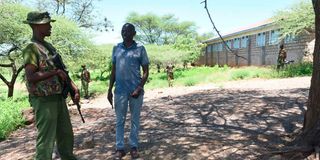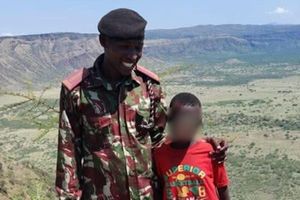
GSU Inspector Intalo Torre (left) with Kosile Primary School headteacher Thomas Akeno at the school on May 13, 2024.
Rafters falling from structures and household items strewn in the compounds welcome one to the deserted Kosile Village in insecurity-prone Baringo North sub-county.
The sorry site is because of the attacks in Saimo Soi ward in March last year.
More than 20 people were killed in the attack, with many others escaping with serious gunshot wounds.
Many families were reduced to paupers when their livestock and crop harvests were taken by the marauding criminals.
The incessant attacks drove hundreds of people from their homes in Kosile, Kagir, Ng’aratuo, Chepkoi, Kagir, Yatya, Kapsebeiwo, Chepkewel and other villages nearby.
After the exodus, the criminals descended on the desolate villages and took household items before vandalising the homesteads.
Some of the victims interviewed cited the vandalism and general insecurity as the reasons for not returning home.
When security was restored in June 2024, three months after the families fled, the government returned some people from Ng’aratuko, Kagir and Yatya villages to their homes, but the residents of Kosile remained in “exile” over insecurity fears.
Fourteen months after the attacks and exodus, Kosile village remains deserted.
Not one family has gone back, even after the government set up a General Service Unit (GSU) camp about 500 metres from Kosile Primary School.
The Saturday Nation team visited the area sometime this week. Kosile Shopping Centre, once booming with business, is in ruins, with most structures vandalised. Others have been destroyed by termites.
Household items are strewn in and outside the destroyed houses and shops, indicating that the families and businesspeople took off in a hurry.
The fields that were once rich in pasture are overgrown with shrubs, which have turned into hideouts for armed attackers.
Mr Richard Chepchomei, a village elder, told the Saturday Nation that Kosile residents are not ready to return as they fear for their lives.
Kosile, Mr Chepchomei added, has been affected by insecurity for many years, making villagers flee whenever there are flare-ups.
Displaced countless times
“The households have borne the brunt of livestock theft and attacks by armed gangs for far tool long. They have also been displaced countless times,” the elder said.
“When they return to their homes with their animals, the bandits emerge from their hideouts and either kill people or steal the livestock. It is a situation that has planted fear in the residents. That is why they will take long to come back.”
There is little sign of life in Kosile, Lobotbuch, Chemongoi, Koitukum, Kamenjo and Nyalilbuch villages.
The families fled to Chebarsiat, Rondinin, Endao, Moinonin, Kampi Samaki, Barkipi, Kimorok, Kipsaraman, and Kerio Valley.
When the more than 20 learning institutions in Saimo/Soi ward were reopened in June last year, Kosile Primary School also opened doors to learners in Grade Three to Nine, albeit without their parents.
Mr Wesley Chirchir, a local, said the families fled to safer areas. When the schools re-opened, the families released the children, who were ferried by police lorries at that time.
The children were made to remain at the institution that has no boarding facilities.
“There were no schools to accommodate all the children from the affected villages who had sought refuge in other places. Police used their trucks to take the children to the school in Kosile but we haven’t returned home. Government officials want us to return but we are not assured of safety,” Mr Chirchir said.
“When schools close, the children go to the villages hosting their families.”
He added that though it is not safe for children to remain in the deserted village without their parents, the families have no other choice.
“The attackers looted everything and destroyed our houses. We still hope to return there, but only after the government assures these families of their safety. We have suffered enough,” Mr Chirchir said.
Mr Chepchomei, Mr Chirchir and other Kosile locals said they have fled the village many times in the last three years, thanks to bandit attacks.
Mr Chirchir said the families have not engaged in any meaningful economic activities, including planting crops, for long due to endless insecurity.
Destroyed families
“We have been reduced to beggars. Overgrown bushes and shrubs have taken the place of maize, beans and other crops in what used to be productive farms. The families now rely on well-wishers for everything, including food, shelter, water and clothing. Some families that had money have left the area for good and bought land elsewhere,” Mr Chirchir said.
Mrs Maria Kobilo, a mother of five, told the Saturday Nation that the attacks have destroyed families as men fled with their livestock while women and children have been resettled “in distant lands”.
“Some children have not gone to school after their families fled. Some of the areas their parents went do not have schools. Many families are living in deplorable conditions, not knowing what tomorrow holds,” Mrs Kobilo said.
Kosile Primary School headteacher, Thomas Akeno, said the only option was to host the children at the institution.
The classrooms are used for learning during the day and turned into dormitories at night.
Before the attacks, the school had more than 270 learners. Only 112 remain.
“We can’t host children in lower grades as they need to be with their parents,” the head teacher said.
The school is guarded by at least 12 police reservists, with the GSU camp providing additional security.
“Though the children are far from their families, we are doing all we can to ensure their education is not interrupted or interfered with,” Mr Akeno said.
“Kosile Primary School had no boarding facilities, so the learners at first slept on the floor before a well-wisher came and constructed a temporary dormitory for the girls. We rely on relief food and other assistance.”
“The headteacher pleads with the government to restore sanity in the Baringo North.
“The children need to be with their parents. Many are psychologically affected as they are many kilometres away from their families,” the headteacher said.






